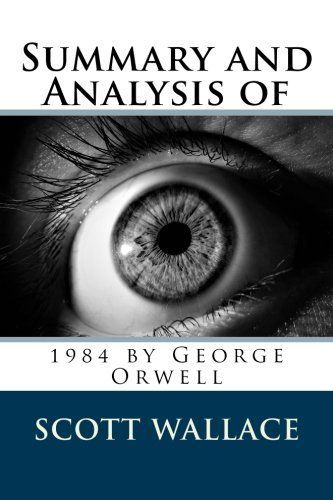
Summary and Analysis of 1984 by George Orwell
1984 is a dystopian novel published in 1949 by English author George Orwell. The novel is set in Airstrip One, formerly Great Britain, a province of the superstate Oceania, whose residents are victims of perpetual war, omnipresent government surveillance and public manipulation. Oceania's political ideology, euphemistically named English Socialism (shortened to "Ingsoc" in Newspeak, the government's invented language that will replace English or Oldspeak) is enforced by the privileged, elite Inner Party. Via the "Thought Police," the Inner Party persecutes individualism and independent thinking, which are regarded as "thoughtcrimes." The tyranny is ostensibly overseen by a mysterious leader known as Big Brother, who enjoys an intense cult of personality. The Party "seeks power entirely for its own sake. It is not interested in the good of others; it is interested solely in power." The protagonist of the novel, Winston Smith, is a member of the Outer Party, who works for the Ministry of Truth, or Minitrue in Newspeak. Minitrue is responsible for propaganda and historical revisionism. Smith's job is to rewrite past newspaper articles, so the historical record always supports the Party's agenda. The workers are told they are correcting misquotations, when they are actually writing false information in the place of fact. Minitrue also destroys all previous editions of revised work. This method ensures there is no proof of government interference. Smith is a diligent and skillful worker, but he secretly hates the Party and dreams of rebellion against Big Brother. Smith begins his acts of rebellion by starting a sexual relationship with Julia, an employee from the Fiction Department at Minitrue. He received a book from O'Brien, a member of the Inner Party and fellow rebel, that details the truth behind the Party's actions. Smith's attempts at self-education and rebellion are ultimately quashed when he is arrested by O'Brien himself. Smith discovers that O'Brien was truly working for the Ministry of Love (Miniluv), the ministry in charge of torturing dissidents. Smith is subjected to many forms of torture and is forced into the horror chamber known only as Room 101. There he is tortured by his worst fear, rats, and is forced to betray Julia. He is released from Miniluv, and Orwell describes his life after his release for the rest of the book. Smith ends the story observing a military update on the telescreen and feeling an intense love for Big Brother. As literary political fiction and dystopian science-fiction, 1984 is a classic novel in content, plot, and style. Many of its terms and concepts, such as Big Brother, doublethink, thoughtcrime, Newspeak, Room 101, telescreen, 2 + 2 = 5, and memory hole, have entered into common usage since its publication in 1949. 1984 popularised the adjective Orwellian, which describes official deception, secret surveillance, brazenly misleading terminology, and manipulation of recorded history by a totalitarian or authoritarian state. In 2005, the novel was chosen by Time magazine as one of the 100 best English-language novels from 1923 to 2005. It was awarded a place on both lists of Modern Library 100 Best Novels, reaching number 13 on the editor's list, and 6 on the readers' list. In 2003, the novel was listed at number 8 on the BBC's survey The Big Read.